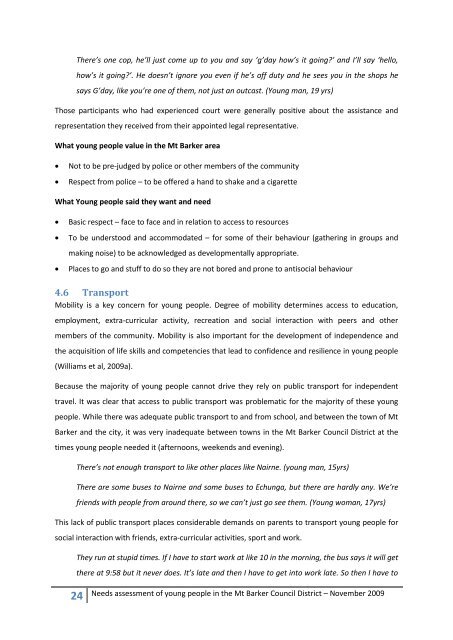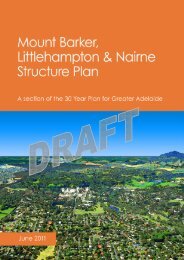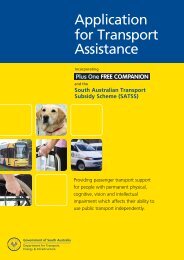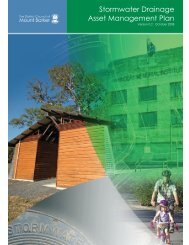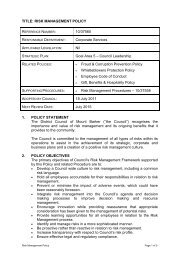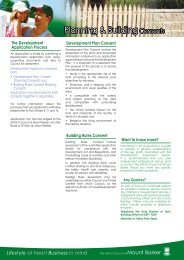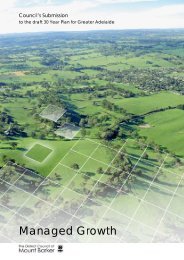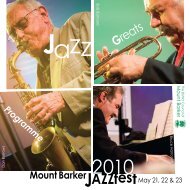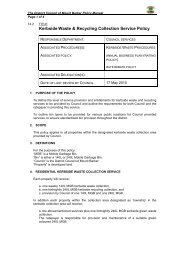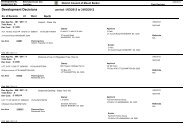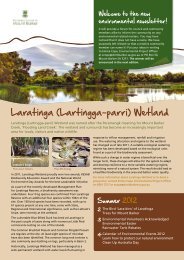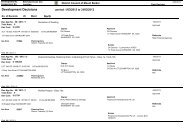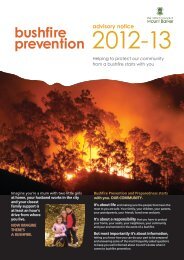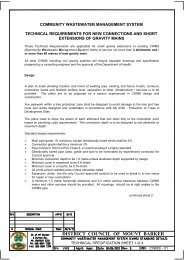Youth Research Qualitative Report - District Council of Mount Barker
Youth Research Qualitative Report - District Council of Mount Barker
Youth Research Qualitative Report - District Council of Mount Barker
Create successful ePaper yourself
Turn your PDF publications into a flip-book with our unique Google optimized e-Paper software.
There’s one cop, he’ll just come up to you and say ‘g’day how’s it going’ and I’ll say ‘hello,<br />
how’s it going’. He doesn’t ignore you even if he’s <strong>of</strong>f duty and he sees you in the shops he<br />
says G’day, like you’re one <strong>of</strong> them, not just an outcast. (Young man, 19 yrs)<br />
Those participants who had experienced court were generally positive about the assistance and<br />
representation they received from their appointed legal representative.<br />
What young people value in the Mt <strong>Barker</strong> area<br />
<br />
<br />
Not to be pre-judged by police or other members <strong>of</strong> the community<br />
Respect from police – to be <strong>of</strong>fered a hand to shake and a cigarette<br />
What Young people said they want and need<br />
<br />
<br />
<br />
Basic respect – face to face and in relation to access to resources<br />
To be understood and accommodated – for some <strong>of</strong> their behaviour (gathering in groups and<br />
making noise) to be acknowledged as developmentally appropriate.<br />
Places to go and stuff to do so they are not bored and prone to antisocial behaviour<br />
4.6 Transport<br />
Mobility is a key concern for young people. Degree <strong>of</strong> mobility determines access to education,<br />
employment, extra-curricular activity, recreation and social interaction with peers and other<br />
members <strong>of</strong> the community. Mobility is also important for the development <strong>of</strong> independence and<br />
the acquisition <strong>of</strong> life skills and competencies that lead to confidence and resilience in young people<br />
(Williams et al, 2009a).<br />
Because the majority <strong>of</strong> young people cannot drive they rely on public transport for independent<br />
travel. It was clear that access to public transport was problematic for the majority <strong>of</strong> these young<br />
people. While there was adequate public transport to and from school, and between the town <strong>of</strong> Mt<br />
<strong>Barker</strong> and the city, it was very inadequate between towns in the Mt <strong>Barker</strong> <strong>Council</strong> <strong>District</strong> at the<br />
times young people needed it (afternoons, weekends and evening).<br />
There’s not enough transport to like other places like Nairne. (young man, 15yrs)<br />
There are some buses to Nairne and some buses to Echunga, but there are hardly any. We’re<br />
friends with people from around there, so we can’t just go see them. (Young woman, 17yrs)<br />
This lack <strong>of</strong> public transport places considerable demands on parents to transport young people for<br />
social interaction with friends, extra-curricular activities, sport and work.<br />
They run at stupid times. If I have to start work at like 10 in the morning, the bus says it will get<br />
there at 9:58 but it never does. It’s late and then I have to get into work late. So then I have to<br />
24<br />
Needs assessment <strong>of</strong> young people in the Mt <strong>Barker</strong> <strong>Council</strong> <strong>District</strong> – November 2009


